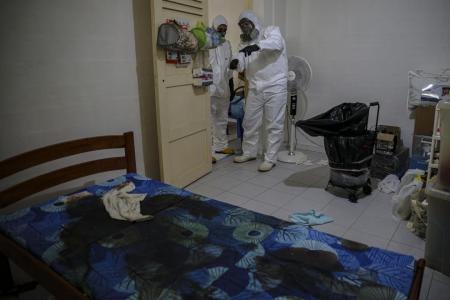Cleaning up after death: Meet Singapore’s trauma cleaner
Cleaning up the remains of decomposed bodies is all in a day’s work for Mr Rahman Razali, a trauma cleaner.
The 40-year-old has cleaned up murder, suicide and accident scenes, but most often deals with cases involving seniors who have died alone.
Trauma cleaning, also known as forensic cleaning, involves removing the waste produced by a decomposed body, cleaning up the space and disposing of personal belongings and furniture that have been contaminated.
During the decomposition process, which occurs within 24 hours of death, fluids such as blood and urine leak from the body, seeping into floors or mattresses.
Mr Rahman recalled having to hack away contaminated parquet flooring in a condominium unit after a middle-aged man living alone in it died without anyone knowing for three months.
This happened during the Covid-19 circuit breaker in 2020.
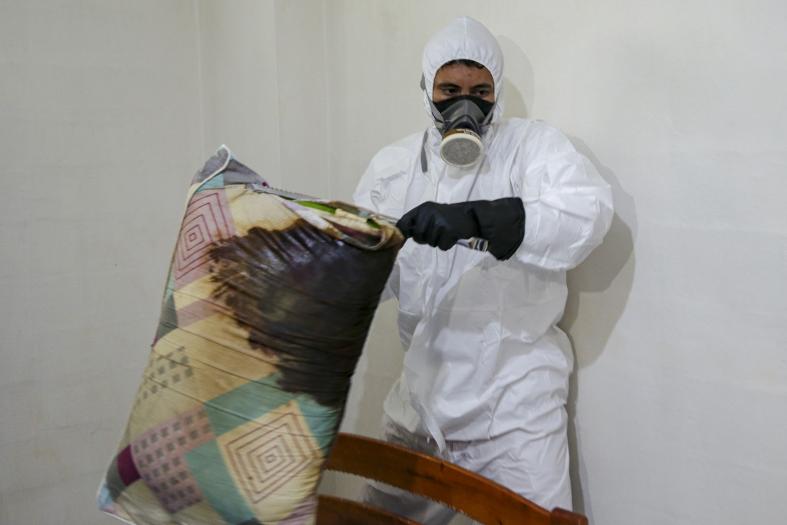
Mr Rahman did not know who found the body, but said the man’s boss contacted him to do the cleaning.
Garbage bags, cable ties, duct tape and isopropyl alcohol are among some of the items that can be found in Mr Rahman's toolkit. Most of the items he uses for trauma cleaning are bought off the shelf. He also includes a portable Islamic prayer mat to do his daily prayers in public places, such as at void decks or multi-storey carparks, during more hectic work days.
NO ONE KNOWS THEY ARE DEAD
Mr Rahman said individuals, especially the elderly, who live alone and die without anyone knowing make up 80 per cent of the cases he deals with.
Almost always, the bodies are discovered only when the stench of decomposition invades neighbours’ homes, he added.
“It’s saddening to see the state of bodies... and no one realising they are dead.”
“The numbers will only increase with the ageing population,” said Mr Rahman, who has been a trauma cleaner since 2015.
He knows of only one other company in Singapore doing trauma cleaning as it is a very specialised type of work and he thinks not many people can deal with the level of gore.
Mr Rahman, who is self-taught, got into the work by chance.
He owns a company called DDQ Services which provides cleaning and disinfecting services at residential and office spaces.
Three years into the business, he was contacted by a relative of an elderly woman who had died after a fall. She was living alone and her body was discovered only a month later.
Upon reaching the location, he recalled his shock on seeing police cordon tape and blood on the ground.
“It was the first time I experienced the smell of a dead body and seeing the blood was traumatising. I poured bleach on the area, told the relatives and police to leave it there for 24 hours, and then went home to Google how to clean up the remains of a dead body,” he said.
Since then, the father of six has refined and improved his cleaning methods. His children are aged 10 months to 18 years old.
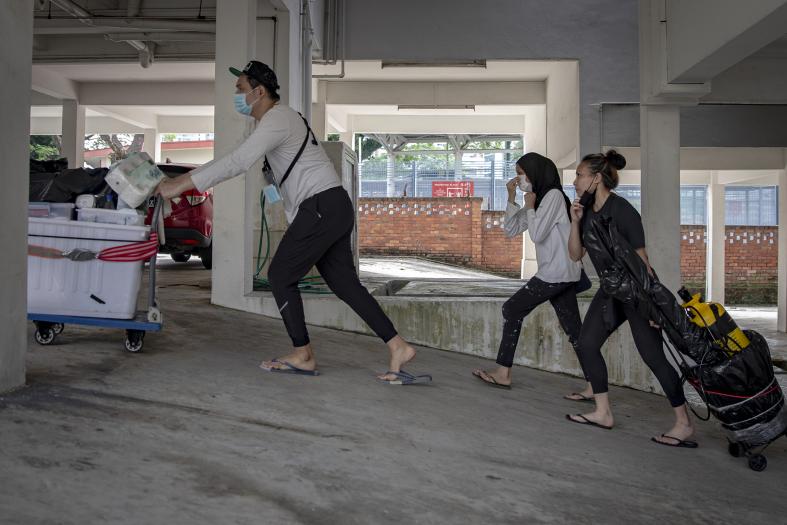
Mr Rahman now leads a team of four trauma cleaners, including his eldest daughter, 18, who works full-time at his company.
They get to work after investigations by the police are completed and the body is taken away by the undertaker.
Mr Rahman recalled that in the early days of his job as a trauma cleaner, he wore disposable raincoats in place of protective suits. He said: "We didn't know about PPE (personal protective equipment) at the time, only that we needed to cover ourselves with something."
A recce of the deceased individual's home is done prior to every cleaning session to assess the logistics and equipment needed so that Mr Rahman is able to brief his teammates on the cleaning plan, as well as inform his client about what needs to be done before the team proceeds. When the client gives them the green light, the team begins their job of cleaning.
The tools and techniques that Mr Rahman uses for trauma cleaning are learnt through trial and error.
The gloves they wear are sealed with duct tape so that the cleaners avoid coming into direct contact with cleaning agents and bodily fluids.
A metal paint scraper taped to the end of a broomstick is one of many tools that Mr Rahman and his team have improvised to scrape off residue left by bodily fluids from the floor. Toilet rolls are another staple in his inventory which he uses to mop up fluids during the cleaning process. He can dispose of these later to avoid contamination.
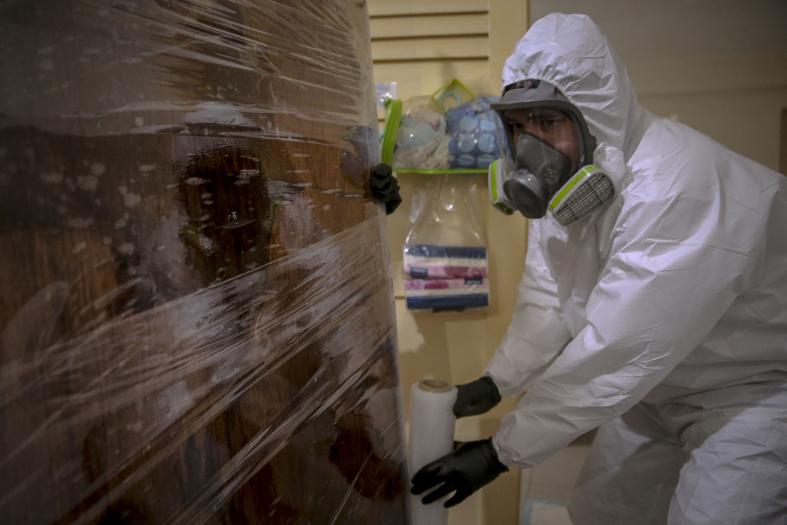
Mr Rahman wrapped part of a bed frame, which was stained with bodily fluids, with cling wrap before disposing it at the garbage point.
This, he said, is done so that anyone else who disposes of the item will not come into direct contact with the bed frame and lowers the risk of encountering biohazardous materials.
The job of a trauma cleaner is not for the faint-hearted.
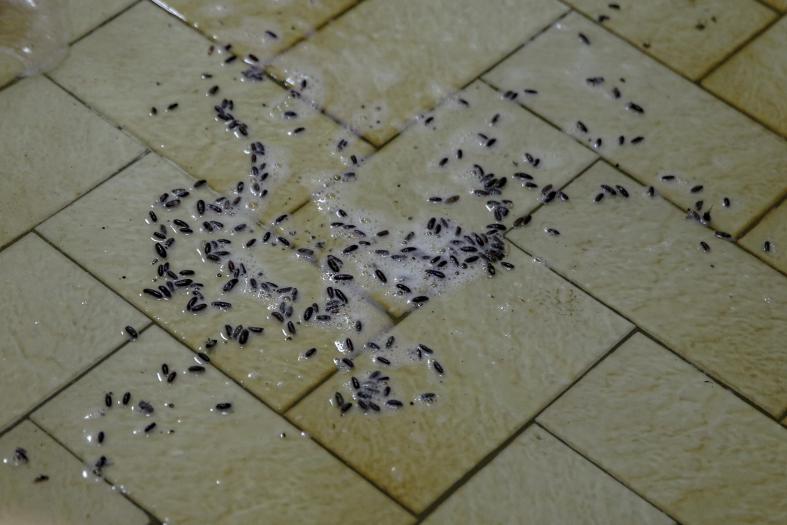
Maggots in the pupa stage are found on the kitchen floor of a unit where a person had died.
The eldest daughter of Mr Rahman, Ms Qasrina Rahman, is seen clearing part of a bed frame from the room of an elderly person. Mr Rahman had initially refused his daughter's offer to help him with his work but eventually relented after a worker called in sick one day.
Calling her his bravest worker, he said that her mental strength is unrivalled among his team, himself included.
The job is also physically demanding.
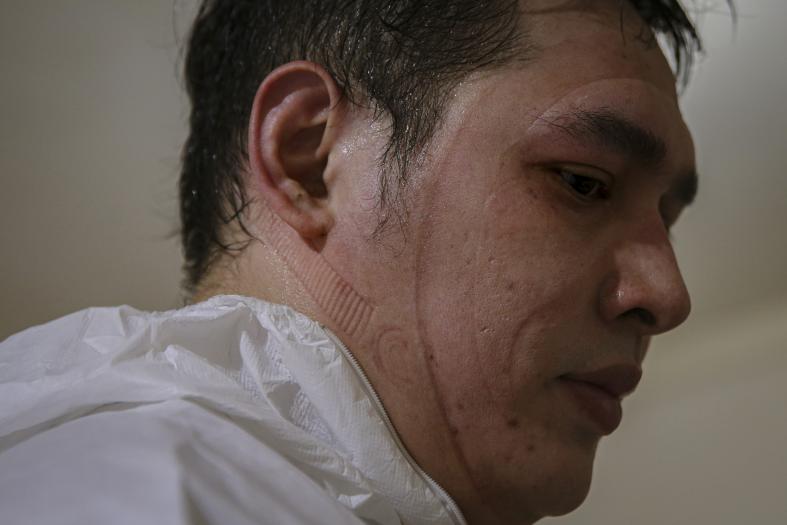
Markings are seen on Mr Rahman’s face after wearing a full-face protective mask for two hours for a cleaning session in Jalan Bukit Merah.
Trauma cleaners don such masks to protect themselves from inhaling fumes from cleaning agents as well as odours that are produced in the process of decomposition.
Mr Rahman also makes it a point to take along a large water bottle on every job as he said it is common to get dehydrated from perspiring while wearing a full PPE suit.
The trauma cleaning team carrying garbage bags containing waste materials down a flight of stairs at a walk-up apartment in Novena as they head towards a garbage point. The apartment they were cleaning was on the fourth and highest floor. Mr Rahman said: “In some of the worst cases, there’s no lift. It’s a bit of an exercise, having to walk up and down the stairs over 20 times to dispose of all the bags.”
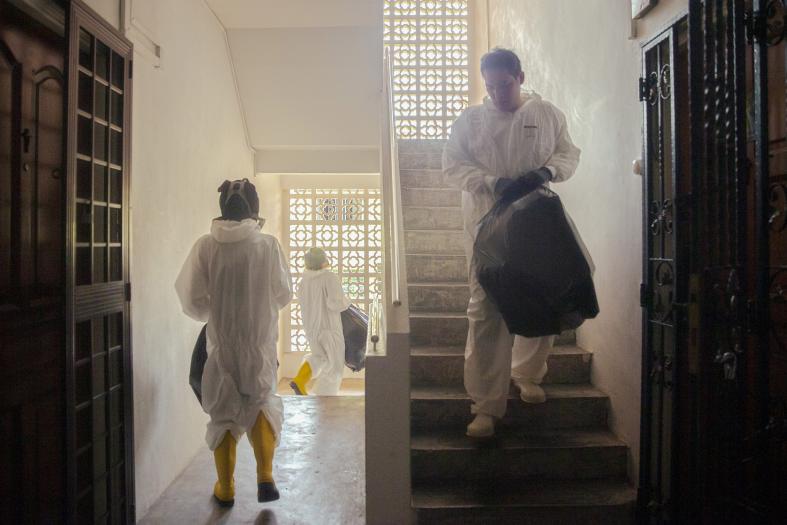
“I see a side of society that not many get to see,” said Mr Rahman, who gets such jobs by word of mouth and charges between $2,000 and $4,000 for each assignment, depending on its complexity.
“We are going in to dignify the place, to clean and make sure there is no more smell... no more traces of the remains,” he added.
Mr Rahman said he often wonders what the dead person was like as a person. “But we have to remain composed and brush off all emotion,” he said.
Aside from cleaning up homes of dead people, he also advises families on the items to keep and reuse. Here, he is seen speaking to a family member after a trauma cleaning session at Jalan Bukit Merah.
"We have to understand their situation - it's usually an overwhelming time for them. You just want to ease the load of someone who is at a loss."
“My job reminds me that death cannot be avoided. So everything that you have right now, you just have to cherish it.”
Get The New Paper on your phone with the free TNP app. Download from the Apple App Store or Google Play Store now

